Rome I Regulation: Analyzing Choice of Law in Online Disputes
VerifiedAdded on 2023/06/13
|16
|5462
|337
Essay
AI Summary
This essay provides a critical evaluation of the Rome I Regulation (CE, 593/2008) concerning disputes arising from online transactions, particularly in the absence of a specified choice of law by the parties involved. It highlights the significance of party autonomy, as enshrined in Article 3, while also examining the limitations placed on this autonomy to protect weaker parties, such as consumers. The analysis delves into Article 4, which addresses applicable law when no choice has been made, comparing it to the Rome Convention and emphasizing the Regulation's clearer structure. The essay further discusses specific rules for financial contracts under Article 4(1)(h) and the displacement rule in Article 4(3), underscoring the balance between certainty and flexibility. Overall, the essay argues that the Rome I Regulation improves upon the Rome Convention, offering beneficial outcomes for both business and legal transactions by providing a more predictable and adaptable framework for resolving online transaction disputes.
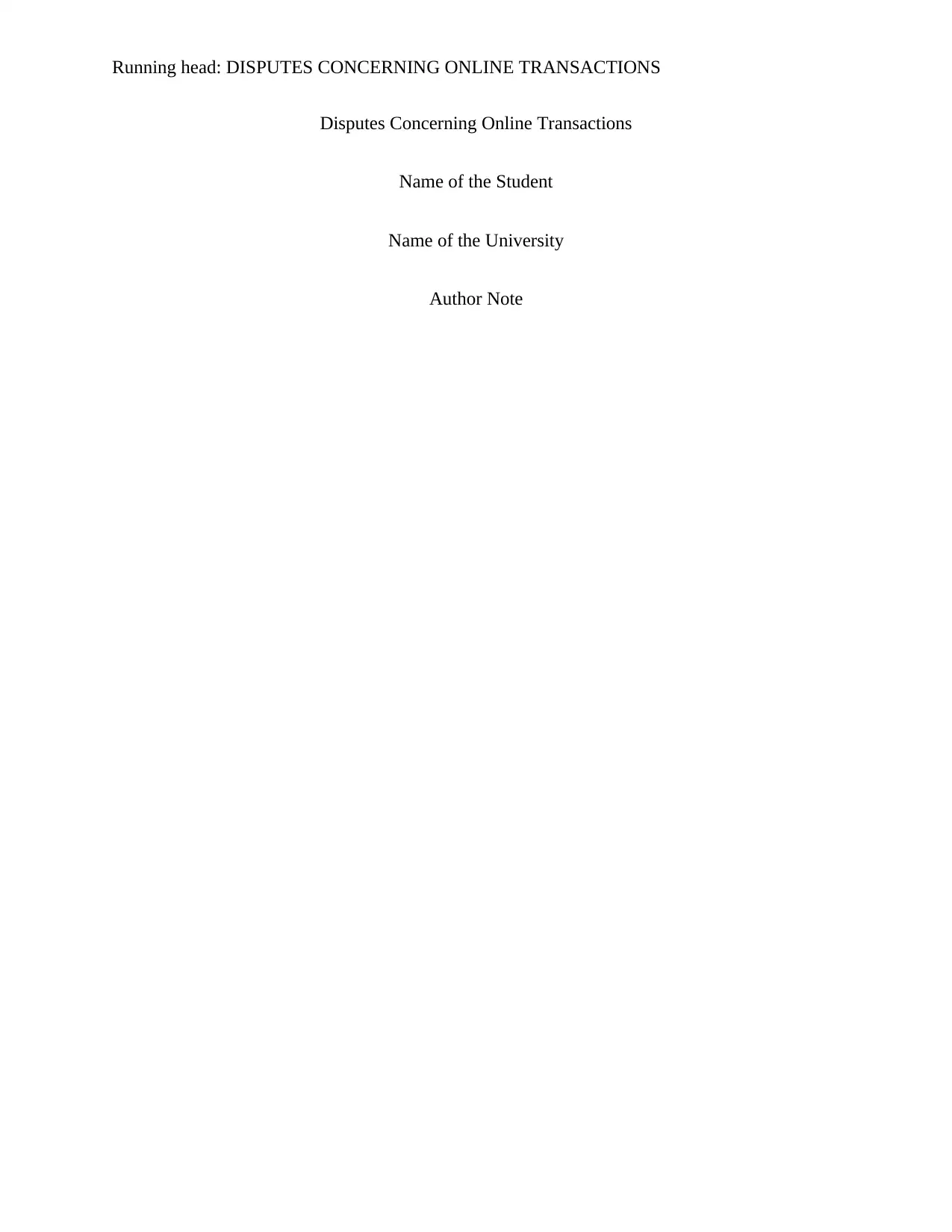
Running head: DISPUTES CONCERNING ONLINE TRANSACTIONS
Disputes Concerning Online Transactions
Name of the Student
Name of the University
Author Note
Disputes Concerning Online Transactions
Name of the Student
Name of the University
Author Note
Paraphrase This Document
Need a fresh take? Get an instant paraphrase of this document with our AI Paraphraser
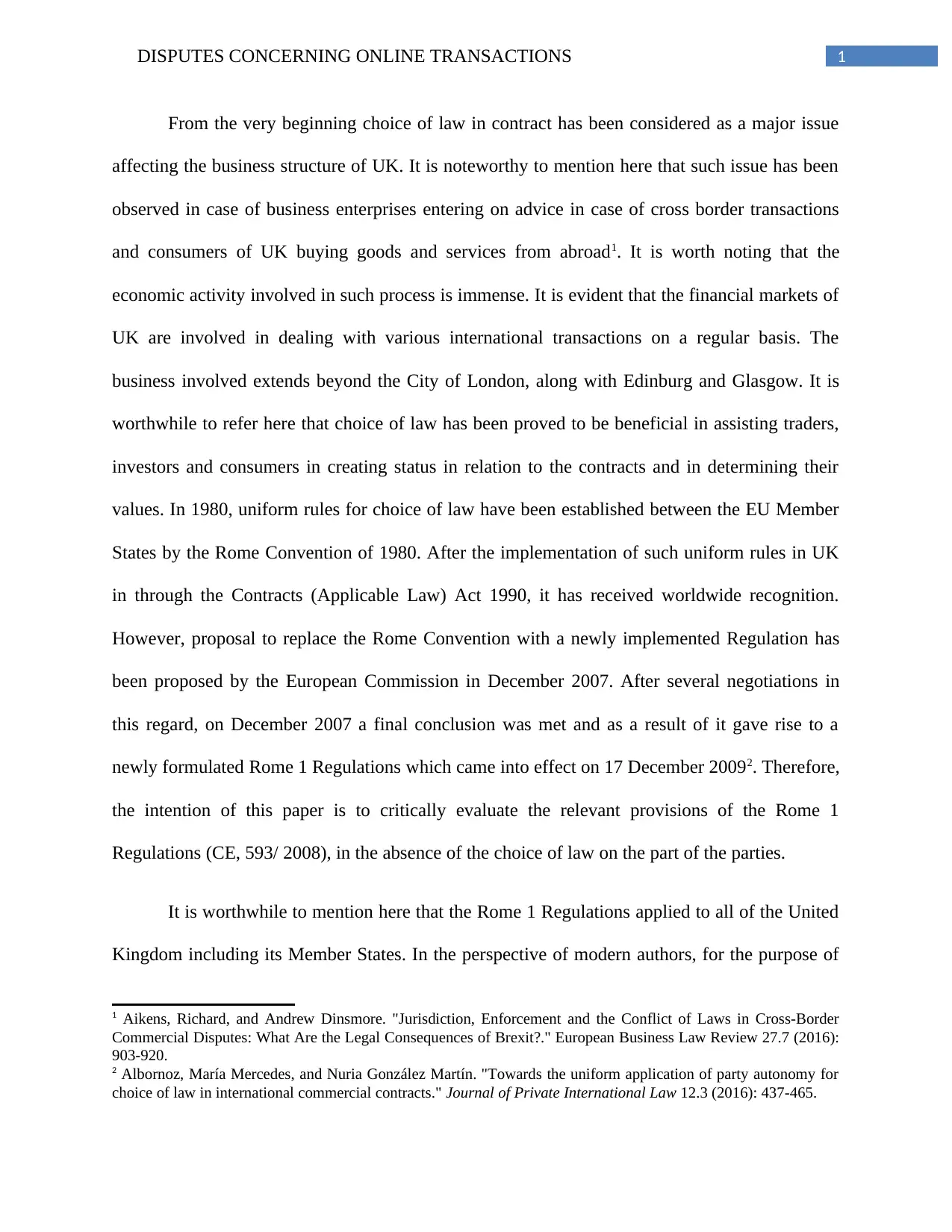
1DISPUTES CONCERNING ONLINE TRANSACTIONS
From the very beginning choice of law in contract has been considered as a major issue
affecting the business structure of UK. It is noteworthy to mention here that such issue has been
observed in case of business enterprises entering on advice in case of cross border transactions
and consumers of UK buying goods and services from abroad1. It is worth noting that the
economic activity involved in such process is immense. It is evident that the financial markets of
UK are involved in dealing with various international transactions on a regular basis. The
business involved extends beyond the City of London, along with Edinburg and Glasgow. It is
worthwhile to refer here that choice of law has been proved to be beneficial in assisting traders,
investors and consumers in creating status in relation to the contracts and in determining their
values. In 1980, uniform rules for choice of law have been established between the EU Member
States by the Rome Convention of 1980. After the implementation of such uniform rules in UK
in through the Contracts (Applicable Law) Act 1990, it has received worldwide recognition.
However, proposal to replace the Rome Convention with a newly implemented Regulation has
been proposed by the European Commission in December 2007. After several negotiations in
this regard, on December 2007 a final conclusion was met and as a result of it gave rise to a
newly formulated Rome 1 Regulations which came into effect on 17 December 20092. Therefore,
the intention of this paper is to critically evaluate the relevant provisions of the Rome 1
Regulations (CE, 593/ 2008), in the absence of the choice of law on the part of the parties.
It is worthwhile to mention here that the Rome 1 Regulations applied to all of the United
Kingdom including its Member States. In the perspective of modern authors, for the purpose of
1 Aikens, Richard, and Andrew Dinsmore. "Jurisdiction, Enforcement and the Conflict of Laws in Cross-Border
Commercial Disputes: What Are the Legal Consequences of Brexit?." European Business Law Review 27.7 (2016):
903-920.
2 Albornoz, María Mercedes, and Nuria González Martín. "Towards the uniform application of party autonomy for
choice of law in international commercial contracts." Journal of Private International Law 12.3 (2016): 437-465.
From the very beginning choice of law in contract has been considered as a major issue
affecting the business structure of UK. It is noteworthy to mention here that such issue has been
observed in case of business enterprises entering on advice in case of cross border transactions
and consumers of UK buying goods and services from abroad1. It is worth noting that the
economic activity involved in such process is immense. It is evident that the financial markets of
UK are involved in dealing with various international transactions on a regular basis. The
business involved extends beyond the City of London, along with Edinburg and Glasgow. It is
worthwhile to refer here that choice of law has been proved to be beneficial in assisting traders,
investors and consumers in creating status in relation to the contracts and in determining their
values. In 1980, uniform rules for choice of law have been established between the EU Member
States by the Rome Convention of 1980. After the implementation of such uniform rules in UK
in through the Contracts (Applicable Law) Act 1990, it has received worldwide recognition.
However, proposal to replace the Rome Convention with a newly implemented Regulation has
been proposed by the European Commission in December 2007. After several negotiations in
this regard, on December 2007 a final conclusion was met and as a result of it gave rise to a
newly formulated Rome 1 Regulations which came into effect on 17 December 20092. Therefore,
the intention of this paper is to critically evaluate the relevant provisions of the Rome 1
Regulations (CE, 593/ 2008), in the absence of the choice of law on the part of the parties.
It is worthwhile to mention here that the Rome 1 Regulations applied to all of the United
Kingdom including its Member States. In the perspective of modern authors, for the purpose of
1 Aikens, Richard, and Andrew Dinsmore. "Jurisdiction, Enforcement and the Conflict of Laws in Cross-Border
Commercial Disputes: What Are the Legal Consequences of Brexit?." European Business Law Review 27.7 (2016):
903-920.
2 Albornoz, María Mercedes, and Nuria González Martín. "Towards the uniform application of party autonomy for
choice of law in international commercial contracts." Journal of Private International Law 12.3 (2016): 437-465.
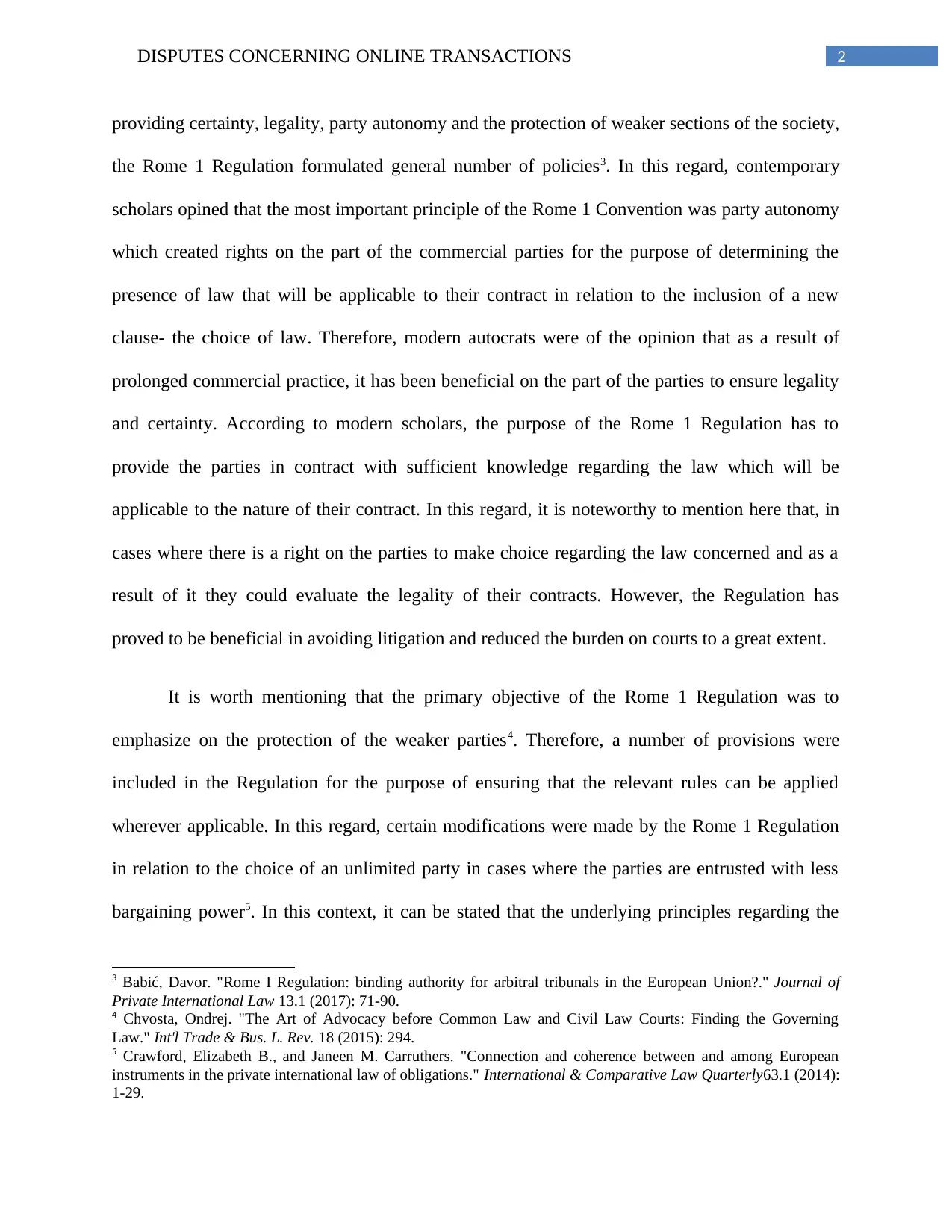
2DISPUTES CONCERNING ONLINE TRANSACTIONS
providing certainty, legality, party autonomy and the protection of weaker sections of the society,
the Rome 1 Regulation formulated general number of policies3. In this regard, contemporary
scholars opined that the most important principle of the Rome 1 Convention was party autonomy
which created rights on the part of the commercial parties for the purpose of determining the
presence of law that will be applicable to their contract in relation to the inclusion of a new
clause- the choice of law. Therefore, modern autocrats were of the opinion that as a result of
prolonged commercial practice, it has been beneficial on the part of the parties to ensure legality
and certainty. According to modern scholars, the purpose of the Rome 1 Regulation has to
provide the parties in contract with sufficient knowledge regarding the law which will be
applicable to the nature of their contract. In this regard, it is noteworthy to mention here that, in
cases where there is a right on the parties to make choice regarding the law concerned and as a
result of it they could evaluate the legality of their contracts. However, the Regulation has
proved to be beneficial in avoiding litigation and reduced the burden on courts to a great extent.
It is worth mentioning that the primary objective of the Rome 1 Regulation was to
emphasize on the protection of the weaker parties4. Therefore, a number of provisions were
included in the Regulation for the purpose of ensuring that the relevant rules can be applied
wherever applicable. In this regard, certain modifications were made by the Rome 1 Regulation
in relation to the choice of an unlimited party in cases where the parties are entrusted with less
bargaining power5. In this context, it can be stated that the underlying principles regarding the
3 Babić, Davor. "Rome I Regulation: binding authority for arbitral tribunals in the European Union?." Journal of
Private International Law 13.1 (2017): 71-90.
4 Chvosta, Ondrej. "The Art of Advocacy before Common Law and Civil Law Courts: Finding the Governing
Law." Int'l Trade & Bus. L. Rev. 18 (2015): 294.
5 Crawford, Elizabeth B., and Janeen M. Carruthers. "Connection and coherence between and among European
instruments in the private international law of obligations." International & Comparative Law Quarterly63.1 (2014):
1-29.
providing certainty, legality, party autonomy and the protection of weaker sections of the society,
the Rome 1 Regulation formulated general number of policies3. In this regard, contemporary
scholars opined that the most important principle of the Rome 1 Convention was party autonomy
which created rights on the part of the commercial parties for the purpose of determining the
presence of law that will be applicable to their contract in relation to the inclusion of a new
clause- the choice of law. Therefore, modern autocrats were of the opinion that as a result of
prolonged commercial practice, it has been beneficial on the part of the parties to ensure legality
and certainty. According to modern scholars, the purpose of the Rome 1 Regulation has to
provide the parties in contract with sufficient knowledge regarding the law which will be
applicable to the nature of their contract. In this regard, it is noteworthy to mention here that, in
cases where there is a right on the parties to make choice regarding the law concerned and as a
result of it they could evaluate the legality of their contracts. However, the Regulation has
proved to be beneficial in avoiding litigation and reduced the burden on courts to a great extent.
It is worth mentioning that the primary objective of the Rome 1 Regulation was to
emphasize on the protection of the weaker parties4. Therefore, a number of provisions were
included in the Regulation for the purpose of ensuring that the relevant rules can be applied
wherever applicable. In this regard, certain modifications were made by the Rome 1 Regulation
in relation to the choice of an unlimited party in cases where the parties are entrusted with less
bargaining power5. In this context, it can be stated that the underlying principles regarding the
3 Babić, Davor. "Rome I Regulation: binding authority for arbitral tribunals in the European Union?." Journal of
Private International Law 13.1 (2017): 71-90.
4 Chvosta, Ondrej. "The Art of Advocacy before Common Law and Civil Law Courts: Finding the Governing
Law." Int'l Trade & Bus. L. Rev. 18 (2015): 294.
5 Crawford, Elizabeth B., and Janeen M. Carruthers. "Connection and coherence between and among European
instruments in the private international law of obligations." International & Comparative Law Quarterly63.1 (2014):
1-29.
⊘ This is a preview!⊘
Do you want full access?
Subscribe today to unlock all pages.

Trusted by 1+ million students worldwide
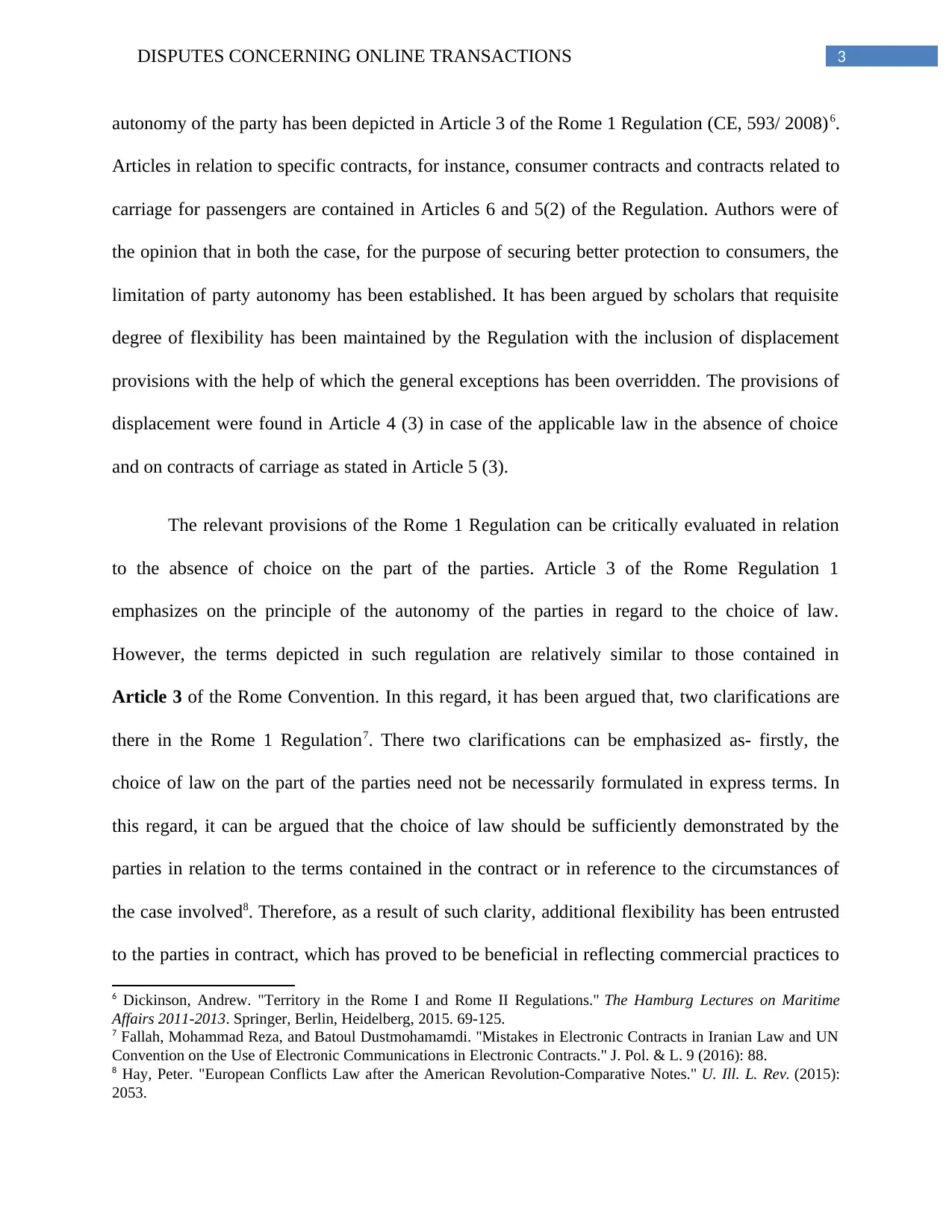
3DISPUTES CONCERNING ONLINE TRANSACTIONS
autonomy of the party has been depicted in Article 3 of the Rome 1 Regulation (CE, 593/ 2008)6.
Articles in relation to specific contracts, for instance, consumer contracts and contracts related to
carriage for passengers are contained in Articles 6 and 5(2) of the Regulation. Authors were of
the opinion that in both the case, for the purpose of securing better protection to consumers, the
limitation of party autonomy has been established. It has been argued by scholars that requisite
degree of flexibility has been maintained by the Regulation with the inclusion of displacement
provisions with the help of which the general exceptions has been overridden. The provisions of
displacement were found in Article 4 (3) in case of the applicable law in the absence of choice
and on contracts of carriage as stated in Article 5 (3).
The relevant provisions of the Rome 1 Regulation can be critically evaluated in relation
to the absence of choice on the part of the parties. Article 3 of the Rome Regulation 1
emphasizes on the principle of the autonomy of the parties in regard to the choice of law.
However, the terms depicted in such regulation are relatively similar to those contained in
Article 3 of the Rome Convention. In this regard, it has been argued that, two clarifications are
there in the Rome 1 Regulation7. There two clarifications can be emphasized as- firstly, the
choice of law on the part of the parties need not be necessarily formulated in express terms. In
this regard, it can be argued that the choice of law should be sufficiently demonstrated by the
parties in relation to the terms contained in the contract or in reference to the circumstances of
the case involved8. Therefore, as a result of such clarity, additional flexibility has been entrusted
to the parties in contract, which has proved to be beneficial in reflecting commercial practices to
6 Dickinson, Andrew. "Territory in the Rome I and Rome II Regulations." The Hamburg Lectures on Maritime
Affairs 2011-2013. Springer, Berlin, Heidelberg, 2015. 69-125.
7 Fallah, Mohammad Reza, and Batoul Dustmohamamdi. "Mistakes in Electronic Contracts in Iranian Law and UN
Convention on the Use of Electronic Communications in Electronic Contracts." J. Pol. & L. 9 (2016): 88.
8 Hay, Peter. "European Conflicts Law after the American Revolution-Comparative Notes." U. Ill. L. Rev. (2015):
2053.
autonomy of the party has been depicted in Article 3 of the Rome 1 Regulation (CE, 593/ 2008)6.
Articles in relation to specific contracts, for instance, consumer contracts and contracts related to
carriage for passengers are contained in Articles 6 and 5(2) of the Regulation. Authors were of
the opinion that in both the case, for the purpose of securing better protection to consumers, the
limitation of party autonomy has been established. It has been argued by scholars that requisite
degree of flexibility has been maintained by the Regulation with the inclusion of displacement
provisions with the help of which the general exceptions has been overridden. The provisions of
displacement were found in Article 4 (3) in case of the applicable law in the absence of choice
and on contracts of carriage as stated in Article 5 (3).
The relevant provisions of the Rome 1 Regulation can be critically evaluated in relation
to the absence of choice on the part of the parties. Article 3 of the Rome Regulation 1
emphasizes on the principle of the autonomy of the parties in regard to the choice of law.
However, the terms depicted in such regulation are relatively similar to those contained in
Article 3 of the Rome Convention. In this regard, it has been argued that, two clarifications are
there in the Rome 1 Regulation7. There two clarifications can be emphasized as- firstly, the
choice of law on the part of the parties need not be necessarily formulated in express terms. In
this regard, it can be argued that the choice of law should be sufficiently demonstrated by the
parties in relation to the terms contained in the contract or in reference to the circumstances of
the case involved8. Therefore, as a result of such clarity, additional flexibility has been entrusted
to the parties in contract, which has proved to be beneficial in reflecting commercial practices to
6 Dickinson, Andrew. "Territory in the Rome I and Rome II Regulations." The Hamburg Lectures on Maritime
Affairs 2011-2013. Springer, Berlin, Heidelberg, 2015. 69-125.
7 Fallah, Mohammad Reza, and Batoul Dustmohamamdi. "Mistakes in Electronic Contracts in Iranian Law and UN
Convention on the Use of Electronic Communications in Electronic Contracts." J. Pol. & L. 9 (2016): 88.
8 Hay, Peter. "European Conflicts Law after the American Revolution-Comparative Notes." U. Ill. L. Rev. (2015):
2053.
Paraphrase This Document
Need a fresh take? Get an instant paraphrase of this document with our AI Paraphraser
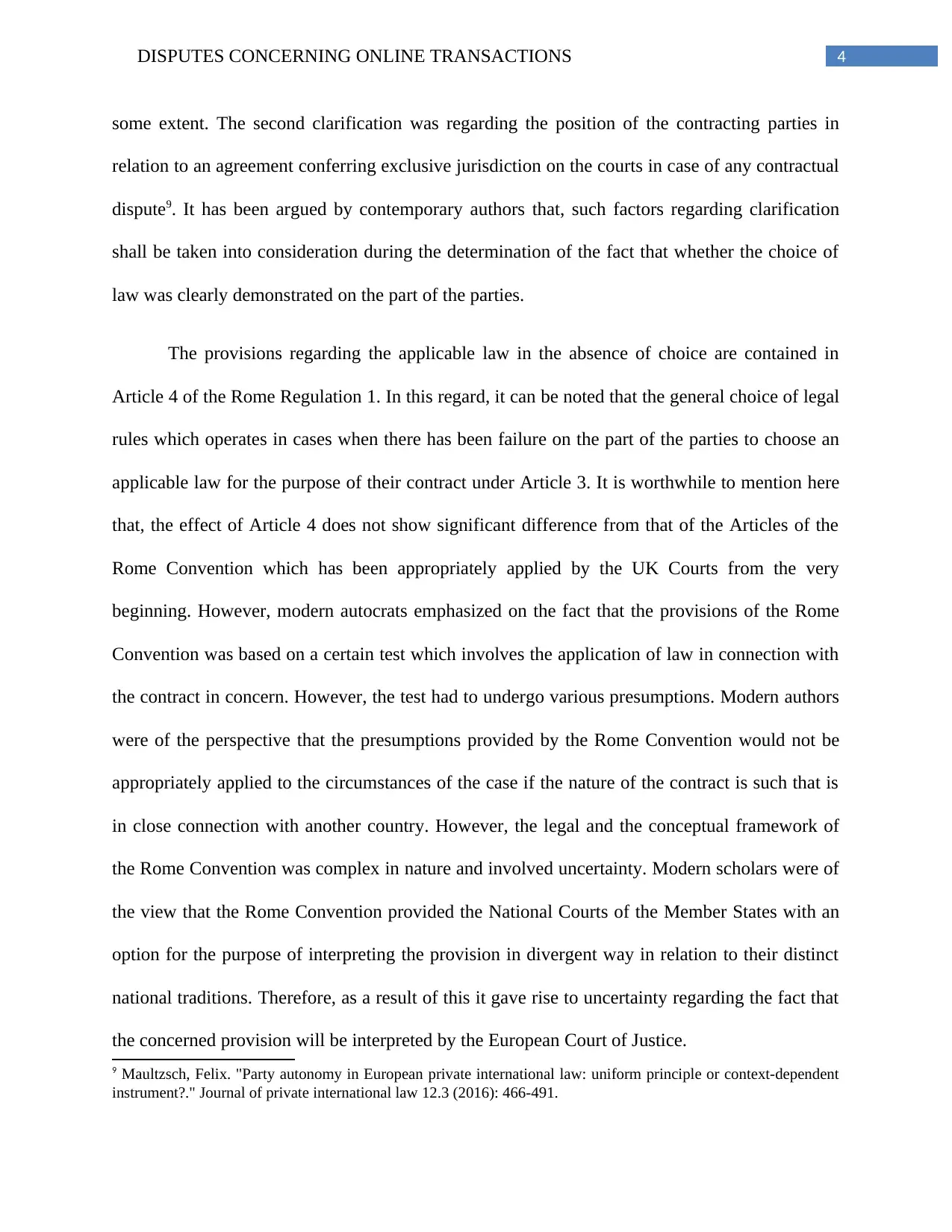
4DISPUTES CONCERNING ONLINE TRANSACTIONS
some extent. The second clarification was regarding the position of the contracting parties in
relation to an agreement conferring exclusive jurisdiction on the courts in case of any contractual
dispute9. It has been argued by contemporary authors that, such factors regarding clarification
shall be taken into consideration during the determination of the fact that whether the choice of
law was clearly demonstrated on the part of the parties.
The provisions regarding the applicable law in the absence of choice are contained in
Article 4 of the Rome Regulation 1. In this regard, it can be noted that the general choice of legal
rules which operates in cases when there has been failure on the part of the parties to choose an
applicable law for the purpose of their contract under Article 3. It is worthwhile to mention here
that, the effect of Article 4 does not show significant difference from that of the Articles of the
Rome Convention which has been appropriately applied by the UK Courts from the very
beginning. However, modern autocrats emphasized on the fact that the provisions of the Rome
Convention was based on a certain test which involves the application of law in connection with
the contract in concern. However, the test had to undergo various presumptions. Modern authors
were of the perspective that the presumptions provided by the Rome Convention would not be
appropriately applied to the circumstances of the case if the nature of the contract is such that is
in close connection with another country. However, the legal and the conceptual framework of
the Rome Convention was complex in nature and involved uncertainty. Modern scholars were of
the view that the Rome Convention provided the National Courts of the Member States with an
option for the purpose of interpreting the provision in divergent way in relation to their distinct
national traditions. Therefore, as a result of this it gave rise to uncertainty regarding the fact that
the concerned provision will be interpreted by the European Court of Justice.
9 Maultzsch, Felix. "Party autonomy in European private international law: uniform principle or context-dependent
instrument?." Journal of private international law 12.3 (2016): 466-491.
some extent. The second clarification was regarding the position of the contracting parties in
relation to an agreement conferring exclusive jurisdiction on the courts in case of any contractual
dispute9. It has been argued by contemporary authors that, such factors regarding clarification
shall be taken into consideration during the determination of the fact that whether the choice of
law was clearly demonstrated on the part of the parties.
The provisions regarding the applicable law in the absence of choice are contained in
Article 4 of the Rome Regulation 1. In this regard, it can be noted that the general choice of legal
rules which operates in cases when there has been failure on the part of the parties to choose an
applicable law for the purpose of their contract under Article 3. It is worthwhile to mention here
that, the effect of Article 4 does not show significant difference from that of the Articles of the
Rome Convention which has been appropriately applied by the UK Courts from the very
beginning. However, modern autocrats emphasized on the fact that the provisions of the Rome
Convention was based on a certain test which involves the application of law in connection with
the contract in concern. However, the test had to undergo various presumptions. Modern authors
were of the perspective that the presumptions provided by the Rome Convention would not be
appropriately applied to the circumstances of the case if the nature of the contract is such that is
in close connection with another country. However, the legal and the conceptual framework of
the Rome Convention was complex in nature and involved uncertainty. Modern scholars were of
the view that the Rome Convention provided the National Courts of the Member States with an
option for the purpose of interpreting the provision in divergent way in relation to their distinct
national traditions. Therefore, as a result of this it gave rise to uncertainty regarding the fact that
the concerned provision will be interpreted by the European Court of Justice.
9 Maultzsch, Felix. "Party autonomy in European private international law: uniform principle or context-dependent
instrument?." Journal of private international law 12.3 (2016): 466-491.
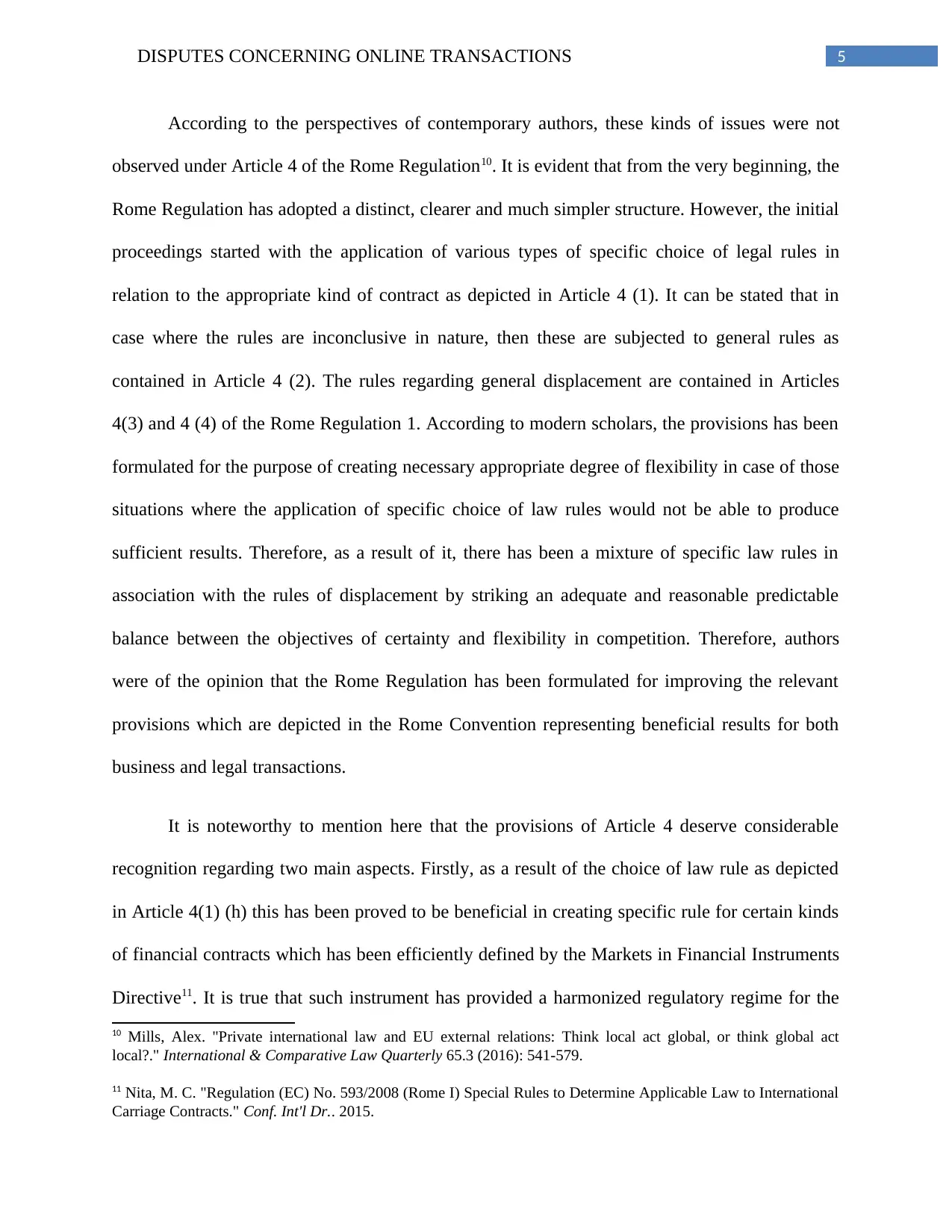
5DISPUTES CONCERNING ONLINE TRANSACTIONS
According to the perspectives of contemporary authors, these kinds of issues were not
observed under Article 4 of the Rome Regulation10. It is evident that from the very beginning, the
Rome Regulation has adopted a distinct, clearer and much simpler structure. However, the initial
proceedings started with the application of various types of specific choice of legal rules in
relation to the appropriate kind of contract as depicted in Article 4 (1). It can be stated that in
case where the rules are inconclusive in nature, then these are subjected to general rules as
contained in Article 4 (2). The rules regarding general displacement are contained in Articles
4(3) and 4 (4) of the Rome Regulation 1. According to modern scholars, the provisions has been
formulated for the purpose of creating necessary appropriate degree of flexibility in case of those
situations where the application of specific choice of law rules would not be able to produce
sufficient results. Therefore, as a result of it, there has been a mixture of specific law rules in
association with the rules of displacement by striking an adequate and reasonable predictable
balance between the objectives of certainty and flexibility in competition. Therefore, authors
were of the opinion that the Rome Regulation has been formulated for improving the relevant
provisions which are depicted in the Rome Convention representing beneficial results for both
business and legal transactions.
It is noteworthy to mention here that the provisions of Article 4 deserve considerable
recognition regarding two main aspects. Firstly, as a result of the choice of law rule as depicted
in Article 4(1) (h) this has been proved to be beneficial in creating specific rule for certain kinds
of financial contracts which has been efficiently defined by the Markets in Financial Instruments
Directive11. It is true that such instrument has provided a harmonized regulatory regime for the
10 Mills, Alex. "Private international law and EU external relations: Think local act global, or think global act
local?." International & Comparative Law Quarterly 65.3 (2016): 541-579.
11 Nita, M. C. "Regulation (EC) No. 593/2008 (Rome I) Special Rules to Determine Applicable Law to International
Carriage Contracts." Conf. Int'l Dr.. 2015.
According to the perspectives of contemporary authors, these kinds of issues were not
observed under Article 4 of the Rome Regulation10. It is evident that from the very beginning, the
Rome Regulation has adopted a distinct, clearer and much simpler structure. However, the initial
proceedings started with the application of various types of specific choice of legal rules in
relation to the appropriate kind of contract as depicted in Article 4 (1). It can be stated that in
case where the rules are inconclusive in nature, then these are subjected to general rules as
contained in Article 4 (2). The rules regarding general displacement are contained in Articles
4(3) and 4 (4) of the Rome Regulation 1. According to modern scholars, the provisions has been
formulated for the purpose of creating necessary appropriate degree of flexibility in case of those
situations where the application of specific choice of law rules would not be able to produce
sufficient results. Therefore, as a result of it, there has been a mixture of specific law rules in
association with the rules of displacement by striking an adequate and reasonable predictable
balance between the objectives of certainty and flexibility in competition. Therefore, authors
were of the opinion that the Rome Regulation has been formulated for improving the relevant
provisions which are depicted in the Rome Convention representing beneficial results for both
business and legal transactions.
It is noteworthy to mention here that the provisions of Article 4 deserve considerable
recognition regarding two main aspects. Firstly, as a result of the choice of law rule as depicted
in Article 4(1) (h) this has been proved to be beneficial in creating specific rule for certain kinds
of financial contracts which has been efficiently defined by the Markets in Financial Instruments
Directive11. It is true that such instrument has provided a harmonized regulatory regime for the
10 Mills, Alex. "Private international law and EU external relations: Think local act global, or think global act
local?." International & Comparative Law Quarterly 65.3 (2016): 541-579.
11 Nita, M. C. "Regulation (EC) No. 593/2008 (Rome I) Special Rules to Determine Applicable Law to International
Carriage Contracts." Conf. Int'l Dr.. 2015.
⊘ This is a preview!⊘
Do you want full access?
Subscribe today to unlock all pages.

Trusted by 1+ million students worldwide
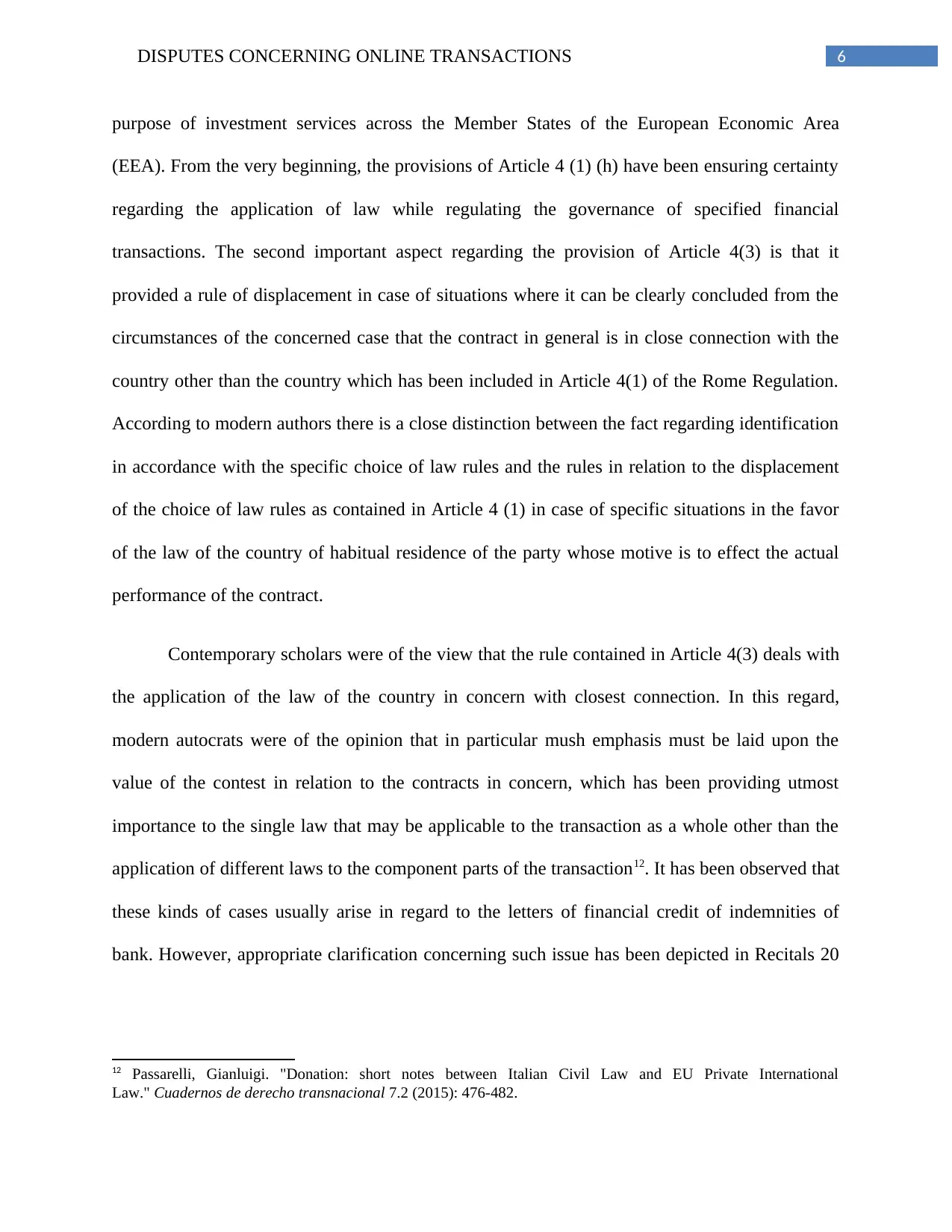
6DISPUTES CONCERNING ONLINE TRANSACTIONS
purpose of investment services across the Member States of the European Economic Area
(EEA). From the very beginning, the provisions of Article 4 (1) (h) have been ensuring certainty
regarding the application of law while regulating the governance of specified financial
transactions. The second important aspect regarding the provision of Article 4(3) is that it
provided a rule of displacement in case of situations where it can be clearly concluded from the
circumstances of the concerned case that the contract in general is in close connection with the
country other than the country which has been included in Article 4(1) of the Rome Regulation.
According to modern authors there is a close distinction between the fact regarding identification
in accordance with the specific choice of law rules and the rules in relation to the displacement
of the choice of law rules as contained in Article 4 (1) in case of specific situations in the favor
of the law of the country of habitual residence of the party whose motive is to effect the actual
performance of the contract.
Contemporary scholars were of the view that the rule contained in Article 4(3) deals with
the application of the law of the country in concern with closest connection. In this regard,
modern autocrats were of the opinion that in particular mush emphasis must be laid upon the
value of the contest in relation to the contracts in concern, which has been providing utmost
importance to the single law that may be applicable to the transaction as a whole other than the
application of different laws to the component parts of the transaction12. It has been observed that
these kinds of cases usually arise in regard to the letters of financial credit of indemnities of
bank. However, appropriate clarification concerning such issue has been depicted in Recitals 20
12 Passarelli, Gianluigi. "Donation: short notes between Italian Civil Law and EU Private International
Law." Cuadernos de derecho transnacional 7.2 (2015): 476-482.
purpose of investment services across the Member States of the European Economic Area
(EEA). From the very beginning, the provisions of Article 4 (1) (h) have been ensuring certainty
regarding the application of law while regulating the governance of specified financial
transactions. The second important aspect regarding the provision of Article 4(3) is that it
provided a rule of displacement in case of situations where it can be clearly concluded from the
circumstances of the concerned case that the contract in general is in close connection with the
country other than the country which has been included in Article 4(1) of the Rome Regulation.
According to modern authors there is a close distinction between the fact regarding identification
in accordance with the specific choice of law rules and the rules in relation to the displacement
of the choice of law rules as contained in Article 4 (1) in case of specific situations in the favor
of the law of the country of habitual residence of the party whose motive is to effect the actual
performance of the contract.
Contemporary scholars were of the view that the rule contained in Article 4(3) deals with
the application of the law of the country in concern with closest connection. In this regard,
modern autocrats were of the opinion that in particular mush emphasis must be laid upon the
value of the contest in relation to the contracts in concern, which has been providing utmost
importance to the single law that may be applicable to the transaction as a whole other than the
application of different laws to the component parts of the transaction12. It has been observed that
these kinds of cases usually arise in regard to the letters of financial credit of indemnities of
bank. However, appropriate clarification concerning such issue has been depicted in Recitals 20
12 Passarelli, Gianluigi. "Donation: short notes between Italian Civil Law and EU Private International
Law." Cuadernos de derecho transnacional 7.2 (2015): 476-482.
Paraphrase This Document
Need a fresh take? Get an instant paraphrase of this document with our AI Paraphraser
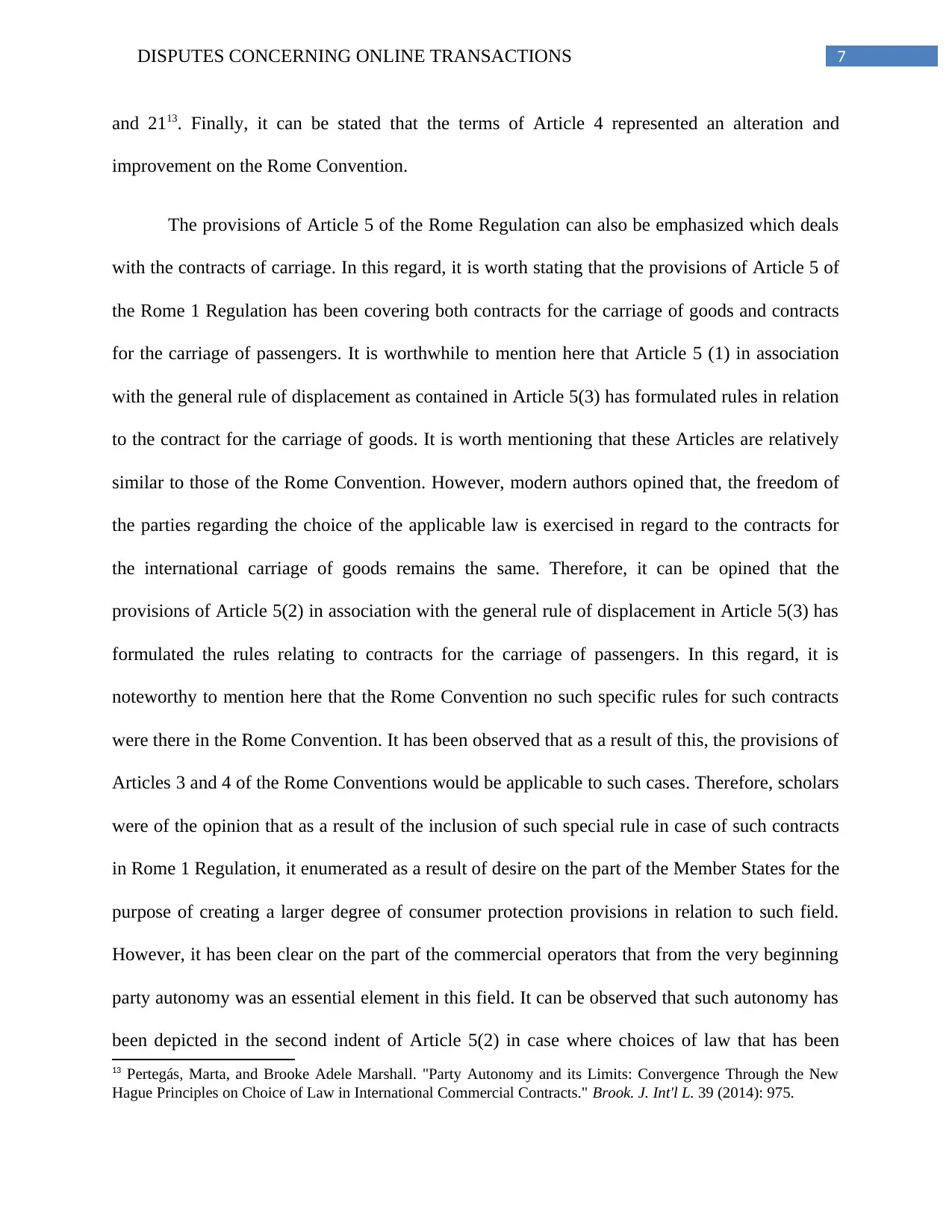
7DISPUTES CONCERNING ONLINE TRANSACTIONS
and 2113. Finally, it can be stated that the terms of Article 4 represented an alteration and
improvement on the Rome Convention.
The provisions of Article 5 of the Rome Regulation can also be emphasized which deals
with the contracts of carriage. In this regard, it is worth stating that the provisions of Article 5 of
the Rome 1 Regulation has been covering both contracts for the carriage of goods and contracts
for the carriage of passengers. It is worthwhile to mention here that Article 5 (1) in association
with the general rule of displacement as contained in Article 5(3) has formulated rules in relation
to the contract for the carriage of goods. It is worth mentioning that these Articles are relatively
similar to those of the Rome Convention. However, modern authors opined that, the freedom of
the parties regarding the choice of the applicable law is exercised in regard to the contracts for
the international carriage of goods remains the same. Therefore, it can be opined that the
provisions of Article 5(2) in association with the general rule of displacement in Article 5(3) has
formulated the rules relating to contracts for the carriage of passengers. In this regard, it is
noteworthy to mention here that the Rome Convention no such specific rules for such contracts
were there in the Rome Convention. It has been observed that as a result of this, the provisions of
Articles 3 and 4 of the Rome Conventions would be applicable to such cases. Therefore, scholars
were of the opinion that as a result of the inclusion of such special rule in case of such contracts
in Rome 1 Regulation, it enumerated as a result of desire on the part of the Member States for the
purpose of creating a larger degree of consumer protection provisions in relation to such field.
However, it has been clear on the part of the commercial operators that from the very beginning
party autonomy was an essential element in this field. It can be observed that such autonomy has
been depicted in the second indent of Article 5(2) in case where choices of law that has been
13 Pertegás, Marta, and Brooke Adele Marshall. "Party Autonomy and its Limits: Convergence Through the New
Hague Principles on Choice of Law in International Commercial Contracts." Brook. J. Int'l L. 39 (2014): 975.
and 2113. Finally, it can be stated that the terms of Article 4 represented an alteration and
improvement on the Rome Convention.
The provisions of Article 5 of the Rome Regulation can also be emphasized which deals
with the contracts of carriage. In this regard, it is worth stating that the provisions of Article 5 of
the Rome 1 Regulation has been covering both contracts for the carriage of goods and contracts
for the carriage of passengers. It is worthwhile to mention here that Article 5 (1) in association
with the general rule of displacement as contained in Article 5(3) has formulated rules in relation
to the contract for the carriage of goods. It is worth mentioning that these Articles are relatively
similar to those of the Rome Convention. However, modern authors opined that, the freedom of
the parties regarding the choice of the applicable law is exercised in regard to the contracts for
the international carriage of goods remains the same. Therefore, it can be opined that the
provisions of Article 5(2) in association with the general rule of displacement in Article 5(3) has
formulated the rules relating to contracts for the carriage of passengers. In this regard, it is
noteworthy to mention here that the Rome Convention no such specific rules for such contracts
were there in the Rome Convention. It has been observed that as a result of this, the provisions of
Articles 3 and 4 of the Rome Conventions would be applicable to such cases. Therefore, scholars
were of the opinion that as a result of the inclusion of such special rule in case of such contracts
in Rome 1 Regulation, it enumerated as a result of desire on the part of the Member States for the
purpose of creating a larger degree of consumer protection provisions in relation to such field.
However, it has been clear on the part of the commercial operators that from the very beginning
party autonomy was an essential element in this field. It can be observed that such autonomy has
been depicted in the second indent of Article 5(2) in case where choices of law that has been
13 Pertegás, Marta, and Brooke Adele Marshall. "Party Autonomy and its Limits: Convergence Through the New
Hague Principles on Choice of Law in International Commercial Contracts." Brook. J. Int'l L. 39 (2014): 975.
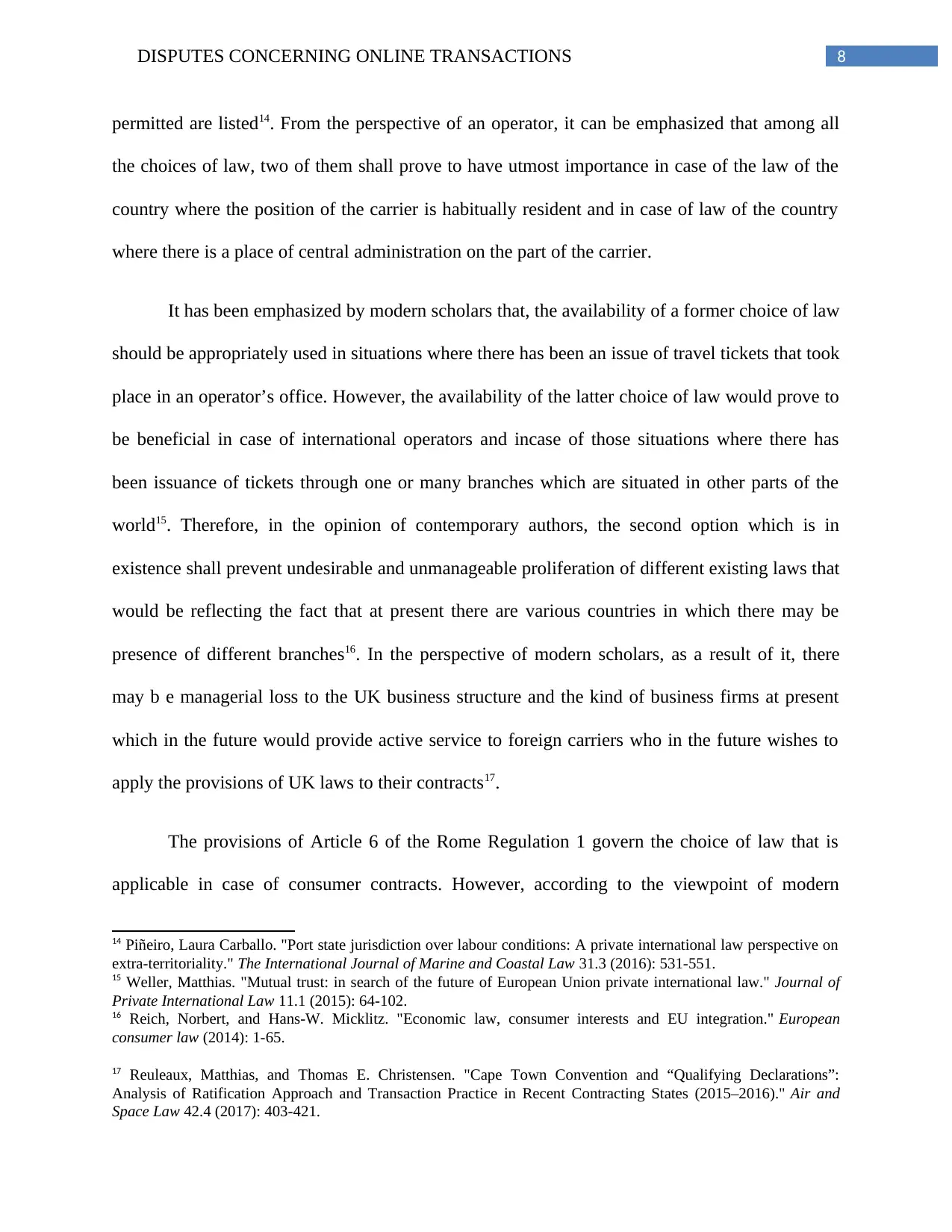
8DISPUTES CONCERNING ONLINE TRANSACTIONS
permitted are listed14. From the perspective of an operator, it can be emphasized that among all
the choices of law, two of them shall prove to have utmost importance in case of the law of the
country where the position of the carrier is habitually resident and in case of law of the country
where there is a place of central administration on the part of the carrier.
It has been emphasized by modern scholars that, the availability of a former choice of law
should be appropriately used in situations where there has been an issue of travel tickets that took
place in an operator’s office. However, the availability of the latter choice of law would prove to
be beneficial in case of international operators and incase of those situations where there has
been issuance of tickets through one or many branches which are situated in other parts of the
world15. Therefore, in the opinion of contemporary authors, the second option which is in
existence shall prevent undesirable and unmanageable proliferation of different existing laws that
would be reflecting the fact that at present there are various countries in which there may be
presence of different branches16. In the perspective of modern scholars, as a result of it, there
may b e managerial loss to the UK business structure and the kind of business firms at present
which in the future would provide active service to foreign carriers who in the future wishes to
apply the provisions of UK laws to their contracts17.
The provisions of Article 6 of the Rome Regulation 1 govern the choice of law that is
applicable in case of consumer contracts. However, according to the viewpoint of modern
14 Piñeiro, Laura Carballo. "Port state jurisdiction over labour conditions: A private international law perspective on
extra-territoriality." The International Journal of Marine and Coastal Law 31.3 (2016): 531-551.
15 Weller, Matthias. "Mutual trust: in search of the future of European Union private international law." Journal of
Private International Law 11.1 (2015): 64-102.
16 Reich, Norbert, and Hans-W. Micklitz. "Economic law, consumer interests and EU integration." European
consumer law (2014): 1-65.
17 Reuleaux, Matthias, and Thomas E. Christensen. "Cape Town Convention and “Qualifying Declarations”:
Analysis of Ratification Approach and Transaction Practice in Recent Contracting States (2015–2016)." Air and
Space Law 42.4 (2017): 403-421.
permitted are listed14. From the perspective of an operator, it can be emphasized that among all
the choices of law, two of them shall prove to have utmost importance in case of the law of the
country where the position of the carrier is habitually resident and in case of law of the country
where there is a place of central administration on the part of the carrier.
It has been emphasized by modern scholars that, the availability of a former choice of law
should be appropriately used in situations where there has been an issue of travel tickets that took
place in an operator’s office. However, the availability of the latter choice of law would prove to
be beneficial in case of international operators and incase of those situations where there has
been issuance of tickets through one or many branches which are situated in other parts of the
world15. Therefore, in the opinion of contemporary authors, the second option which is in
existence shall prevent undesirable and unmanageable proliferation of different existing laws that
would be reflecting the fact that at present there are various countries in which there may be
presence of different branches16. In the perspective of modern scholars, as a result of it, there
may b e managerial loss to the UK business structure and the kind of business firms at present
which in the future would provide active service to foreign carriers who in the future wishes to
apply the provisions of UK laws to their contracts17.
The provisions of Article 6 of the Rome Regulation 1 govern the choice of law that is
applicable in case of consumer contracts. However, according to the viewpoint of modern
14 Piñeiro, Laura Carballo. "Port state jurisdiction over labour conditions: A private international law perspective on
extra-territoriality." The International Journal of Marine and Coastal Law 31.3 (2016): 531-551.
15 Weller, Matthias. "Mutual trust: in search of the future of European Union private international law." Journal of
Private International Law 11.1 (2015): 64-102.
16 Reich, Norbert, and Hans-W. Micklitz. "Economic law, consumer interests and EU integration." European
consumer law (2014): 1-65.
17 Reuleaux, Matthias, and Thomas E. Christensen. "Cape Town Convention and “Qualifying Declarations”:
Analysis of Ratification Approach and Transaction Practice in Recent Contracting States (2015–2016)." Air and
Space Law 42.4 (2017): 403-421.
⊘ This is a preview!⊘
Do you want full access?
Subscribe today to unlock all pages.

Trusted by 1+ million students worldwide
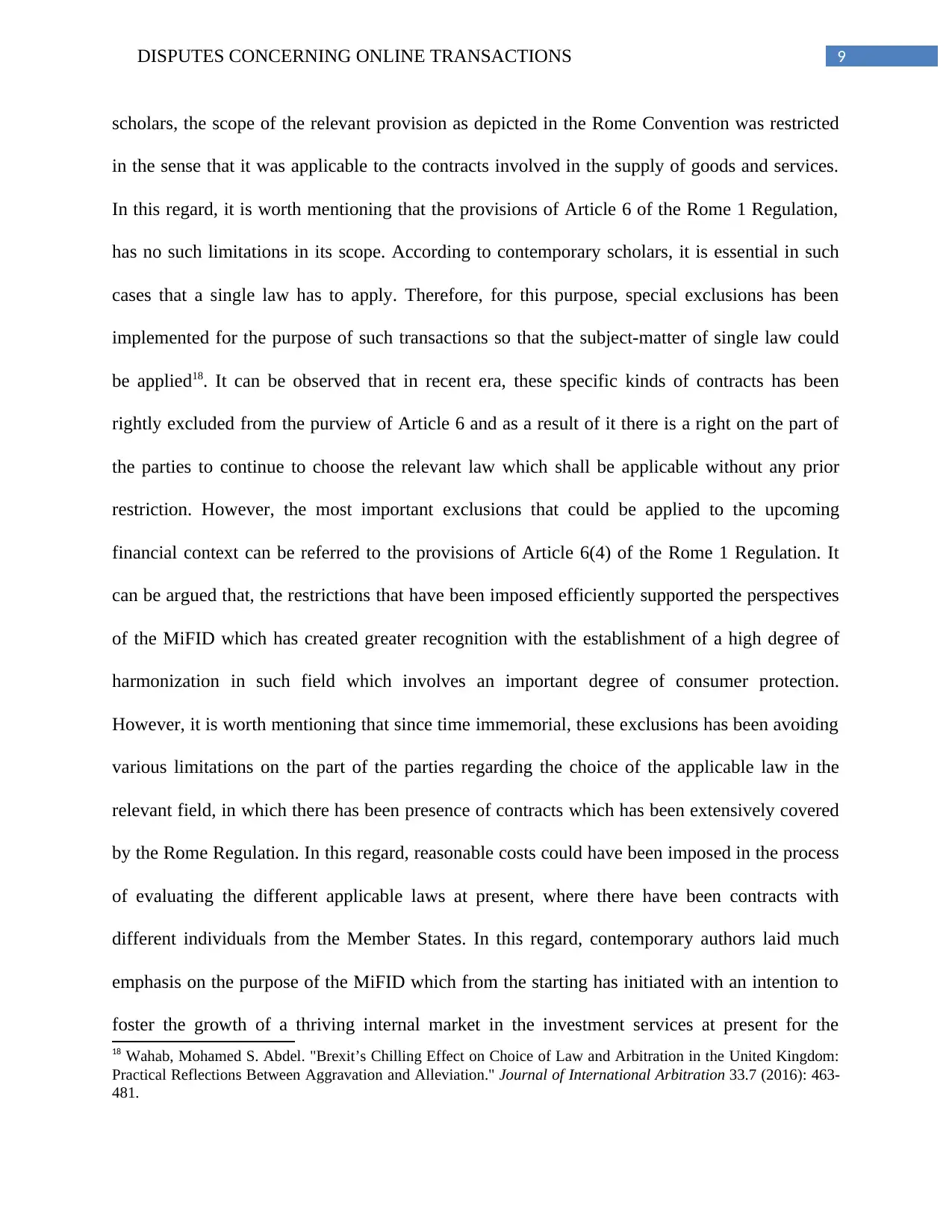
9DISPUTES CONCERNING ONLINE TRANSACTIONS
scholars, the scope of the relevant provision as depicted in the Rome Convention was restricted
in the sense that it was applicable to the contracts involved in the supply of goods and services.
In this regard, it is worth mentioning that the provisions of Article 6 of the Rome 1 Regulation,
has no such limitations in its scope. According to contemporary scholars, it is essential in such
cases that a single law has to apply. Therefore, for this purpose, special exclusions has been
implemented for the purpose of such transactions so that the subject-matter of single law could
be applied18. It can be observed that in recent era, these specific kinds of contracts has been
rightly excluded from the purview of Article 6 and as a result of it there is a right on the part of
the parties to continue to choose the relevant law which shall be applicable without any prior
restriction. However, the most important exclusions that could be applied to the upcoming
financial context can be referred to the provisions of Article 6(4) of the Rome 1 Regulation. It
can be argued that, the restrictions that have been imposed efficiently supported the perspectives
of the MiFID which has created greater recognition with the establishment of a high degree of
harmonization in such field which involves an important degree of consumer protection.
However, it is worth mentioning that since time immemorial, these exclusions has been avoiding
various limitations on the part of the parties regarding the choice of the applicable law in the
relevant field, in which there has been presence of contracts which has been extensively covered
by the Rome Regulation. In this regard, reasonable costs could have been imposed in the process
of evaluating the different applicable laws at present, where there have been contracts with
different individuals from the Member States. In this regard, contemporary authors laid much
emphasis on the purpose of the MiFID which from the starting has initiated with an intention to
foster the growth of a thriving internal market in the investment services at present for the
18 Wahab, Mohamed S. Abdel. "Brexit’s Chilling Effect on Choice of Law and Arbitration in the United Kingdom:
Practical Reflections Between Aggravation and Alleviation." Journal of International Arbitration 33.7 (2016): 463-
481.
scholars, the scope of the relevant provision as depicted in the Rome Convention was restricted
in the sense that it was applicable to the contracts involved in the supply of goods and services.
In this regard, it is worth mentioning that the provisions of Article 6 of the Rome 1 Regulation,
has no such limitations in its scope. According to contemporary scholars, it is essential in such
cases that a single law has to apply. Therefore, for this purpose, special exclusions has been
implemented for the purpose of such transactions so that the subject-matter of single law could
be applied18. It can be observed that in recent era, these specific kinds of contracts has been
rightly excluded from the purview of Article 6 and as a result of it there is a right on the part of
the parties to continue to choose the relevant law which shall be applicable without any prior
restriction. However, the most important exclusions that could be applied to the upcoming
financial context can be referred to the provisions of Article 6(4) of the Rome 1 Regulation. It
can be argued that, the restrictions that have been imposed efficiently supported the perspectives
of the MiFID which has created greater recognition with the establishment of a high degree of
harmonization in such field which involves an important degree of consumer protection.
However, it is worth mentioning that since time immemorial, these exclusions has been avoiding
various limitations on the part of the parties regarding the choice of the applicable law in the
relevant field, in which there has been presence of contracts which has been extensively covered
by the Rome Regulation. In this regard, reasonable costs could have been imposed in the process
of evaluating the different applicable laws at present, where there have been contracts with
different individuals from the Member States. In this regard, contemporary authors laid much
emphasis on the purpose of the MiFID which from the starting has initiated with an intention to
foster the growth of a thriving internal market in the investment services at present for the
18 Wahab, Mohamed S. Abdel. "Brexit’s Chilling Effect on Choice of Law and Arbitration in the United Kingdom:
Practical Reflections Between Aggravation and Alleviation." Journal of International Arbitration 33.7 (2016): 463-
481.
Paraphrase This Document
Need a fresh take? Get an instant paraphrase of this document with our AI Paraphraser
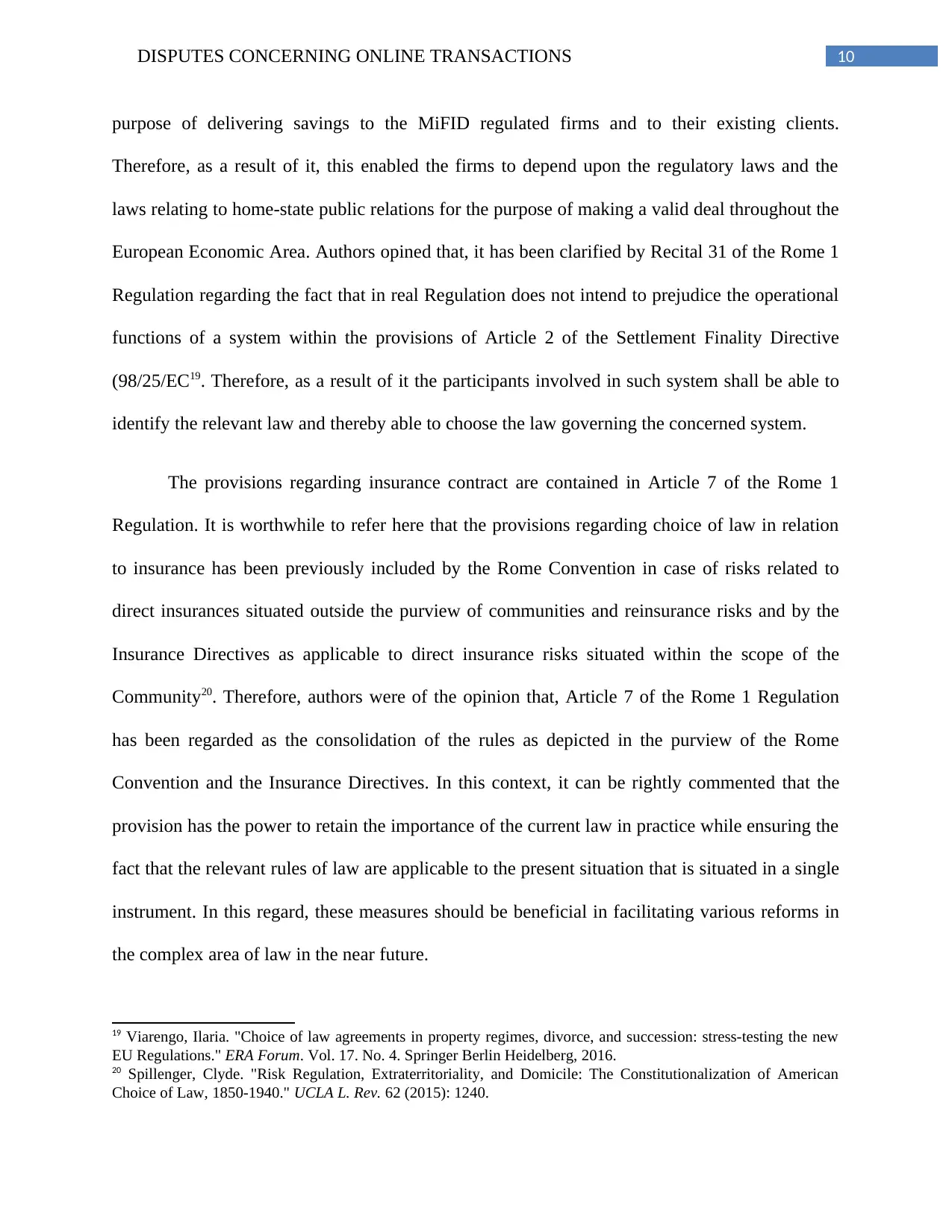
10DISPUTES CONCERNING ONLINE TRANSACTIONS
purpose of delivering savings to the MiFID regulated firms and to their existing clients.
Therefore, as a result of it, this enabled the firms to depend upon the regulatory laws and the
laws relating to home-state public relations for the purpose of making a valid deal throughout the
European Economic Area. Authors opined that, it has been clarified by Recital 31 of the Rome 1
Regulation regarding the fact that in real Regulation does not intend to prejudice the operational
functions of a system within the provisions of Article 2 of the Settlement Finality Directive
(98/25/EC19. Therefore, as a result of it the participants involved in such system shall be able to
identify the relevant law and thereby able to choose the law governing the concerned system.
The provisions regarding insurance contract are contained in Article 7 of the Rome 1
Regulation. It is worthwhile to refer here that the provisions regarding choice of law in relation
to insurance has been previously included by the Rome Convention in case of risks related to
direct insurances situated outside the purview of communities and reinsurance risks and by the
Insurance Directives as applicable to direct insurance risks situated within the scope of the
Community20. Therefore, authors were of the opinion that, Article 7 of the Rome 1 Regulation
has been regarded as the consolidation of the rules as depicted in the purview of the Rome
Convention and the Insurance Directives. In this context, it can be rightly commented that the
provision has the power to retain the importance of the current law in practice while ensuring the
fact that the relevant rules of law are applicable to the present situation that is situated in a single
instrument. In this regard, these measures should be beneficial in facilitating various reforms in
the complex area of law in the near future.
19 Viarengo, Ilaria. "Choice of law agreements in property regimes, divorce, and succession: stress-testing the new
EU Regulations." ERA Forum. Vol. 17. No. 4. Springer Berlin Heidelberg, 2016.
20 Spillenger, Clyde. "Risk Regulation, Extraterritoriality, and Domicile: The Constitutionalization of American
Choice of Law, 1850-1940." UCLA L. Rev. 62 (2015): 1240.
purpose of delivering savings to the MiFID regulated firms and to their existing clients.
Therefore, as a result of it, this enabled the firms to depend upon the regulatory laws and the
laws relating to home-state public relations for the purpose of making a valid deal throughout the
European Economic Area. Authors opined that, it has been clarified by Recital 31 of the Rome 1
Regulation regarding the fact that in real Regulation does not intend to prejudice the operational
functions of a system within the provisions of Article 2 of the Settlement Finality Directive
(98/25/EC19. Therefore, as a result of it the participants involved in such system shall be able to
identify the relevant law and thereby able to choose the law governing the concerned system.
The provisions regarding insurance contract are contained in Article 7 of the Rome 1
Regulation. It is worthwhile to refer here that the provisions regarding choice of law in relation
to insurance has been previously included by the Rome Convention in case of risks related to
direct insurances situated outside the purview of communities and reinsurance risks and by the
Insurance Directives as applicable to direct insurance risks situated within the scope of the
Community20. Therefore, authors were of the opinion that, Article 7 of the Rome 1 Regulation
has been regarded as the consolidation of the rules as depicted in the purview of the Rome
Convention and the Insurance Directives. In this context, it can be rightly commented that the
provision has the power to retain the importance of the current law in practice while ensuring the
fact that the relevant rules of law are applicable to the present situation that is situated in a single
instrument. In this regard, these measures should be beneficial in facilitating various reforms in
the complex area of law in the near future.
19 Viarengo, Ilaria. "Choice of law agreements in property regimes, divorce, and succession: stress-testing the new
EU Regulations." ERA Forum. Vol. 17. No. 4. Springer Berlin Heidelberg, 2016.
20 Spillenger, Clyde. "Risk Regulation, Extraterritoriality, and Domicile: The Constitutionalization of American
Choice of Law, 1850-1940." UCLA L. Rev. 62 (2015): 1240.
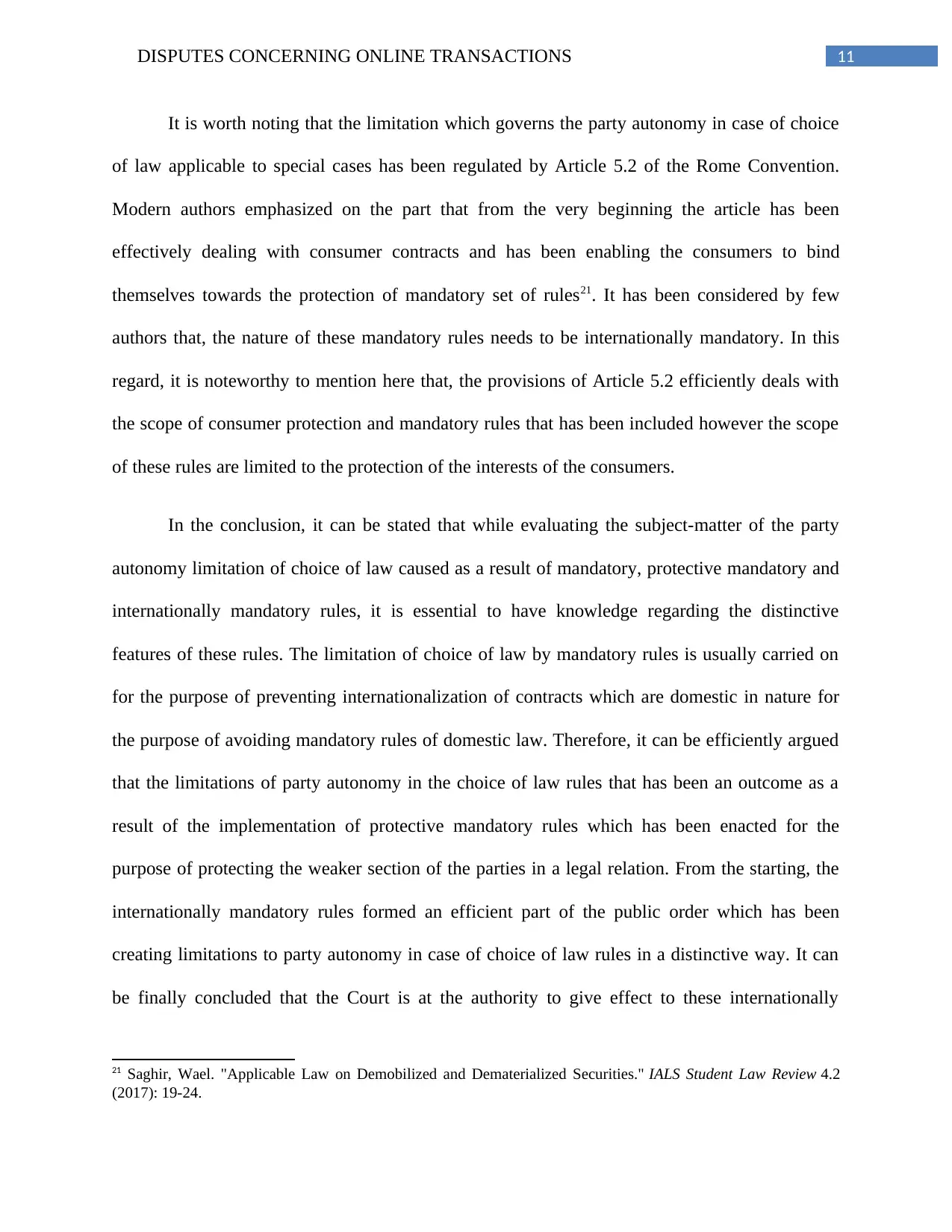
11DISPUTES CONCERNING ONLINE TRANSACTIONS
It is worth noting that the limitation which governs the party autonomy in case of choice
of law applicable to special cases has been regulated by Article 5.2 of the Rome Convention.
Modern authors emphasized on the part that from the very beginning the article has been
effectively dealing with consumer contracts and has been enabling the consumers to bind
themselves towards the protection of mandatory set of rules21. It has been considered by few
authors that, the nature of these mandatory rules needs to be internationally mandatory. In this
regard, it is noteworthy to mention here that, the provisions of Article 5.2 efficiently deals with
the scope of consumer protection and mandatory rules that has been included however the scope
of these rules are limited to the protection of the interests of the consumers.
In the conclusion, it can be stated that while evaluating the subject-matter of the party
autonomy limitation of choice of law caused as a result of mandatory, protective mandatory and
internationally mandatory rules, it is essential to have knowledge regarding the distinctive
features of these rules. The limitation of choice of law by mandatory rules is usually carried on
for the purpose of preventing internationalization of contracts which are domestic in nature for
the purpose of avoiding mandatory rules of domestic law. Therefore, it can be efficiently argued
that the limitations of party autonomy in the choice of law rules that has been an outcome as a
result of the implementation of protective mandatory rules which has been enacted for the
purpose of protecting the weaker section of the parties in a legal relation. From the starting, the
internationally mandatory rules formed an efficient part of the public order which has been
creating limitations to party autonomy in case of choice of law rules in a distinctive way. It can
be finally concluded that the Court is at the authority to give effect to these internationally
21 Saghir, Wael. "Applicable Law on Demobilized and Dematerialized Securities." IALS Student Law Review 4.2
(2017): 19-24.
It is worth noting that the limitation which governs the party autonomy in case of choice
of law applicable to special cases has been regulated by Article 5.2 of the Rome Convention.
Modern authors emphasized on the part that from the very beginning the article has been
effectively dealing with consumer contracts and has been enabling the consumers to bind
themselves towards the protection of mandatory set of rules21. It has been considered by few
authors that, the nature of these mandatory rules needs to be internationally mandatory. In this
regard, it is noteworthy to mention here that, the provisions of Article 5.2 efficiently deals with
the scope of consumer protection and mandatory rules that has been included however the scope
of these rules are limited to the protection of the interests of the consumers.
In the conclusion, it can be stated that while evaluating the subject-matter of the party
autonomy limitation of choice of law caused as a result of mandatory, protective mandatory and
internationally mandatory rules, it is essential to have knowledge regarding the distinctive
features of these rules. The limitation of choice of law by mandatory rules is usually carried on
for the purpose of preventing internationalization of contracts which are domestic in nature for
the purpose of avoiding mandatory rules of domestic law. Therefore, it can be efficiently argued
that the limitations of party autonomy in the choice of law rules that has been an outcome as a
result of the implementation of protective mandatory rules which has been enacted for the
purpose of protecting the weaker section of the parties in a legal relation. From the starting, the
internationally mandatory rules formed an efficient part of the public order which has been
creating limitations to party autonomy in case of choice of law rules in a distinctive way. It can
be finally concluded that the Court is at the authority to give effect to these internationally
21 Saghir, Wael. "Applicable Law on Demobilized and Dematerialized Securities." IALS Student Law Review 4.2
(2017): 19-24.
⊘ This is a preview!⊘
Do you want full access?
Subscribe today to unlock all pages.

Trusted by 1+ million students worldwide
1 out of 16
Related Documents
Your All-in-One AI-Powered Toolkit for Academic Success.
+13062052269
info@desklib.com
Available 24*7 on WhatsApp / Email
![[object Object]](/_next/static/media/star-bottom.7253800d.svg)
Unlock your academic potential
Copyright © 2020–2026 A2Z Services. All Rights Reserved. Developed and managed by ZUCOL.




